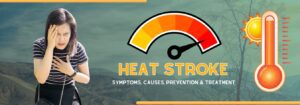Effects of Heat Waves: Causes & How to Stay Cool
What Are Heat Waves?
Heat waves are extended periods of excessively hot weather, often accompanied by high humidity. These extreme weather events can last for several days or even weeks, causing significant disruptions and posing serious health risks. Heat waves are becoming more frequent and intense due to climate change, making it crucial to understand their causes and effects.
Causes of Heat Waves
The primary causes of heat waves are meteorological and climatic factors. A significant factor is the presence of a high-pressure system in the atmosphere, which traps heat and prevents cooler air from entering the region. This phenomenon, known as a heat dome, can persist for days, leading to prolonged high temperatures.
Climate change is another critical factor contributing to the increase in heat waves. The rise in greenhouse gas emissions, primarily carbon dioxide, has led to higher average global temperatures. As the Earth’s climate warms, the likelihood of extreme weather events, including heat waves, increases. Deforestation, urbanization, and other human activities further exacerbate the frequency and severity of these heat events.
Effects of Heat Waves
The effects of heat waves are far-reaching and can impact public health, the environment, and the economy.
Heat and Its Effects on Humans
Heat and its effects on human health are significant. Prolonged exposure to high temperatures can lead to heat-related illnesses, such as heat exhaustion, heatstroke, and dehydration. Vulnerable populations, including the elderly, young children, and individuals with pre-existing health conditions, are particularly at risk.
Heat Exhaustion and Heatstroke
Heat exhaustion occurs when the body cannot cool itself effectively. Symptoms include heavy sweating, weakness, dizziness, nausea, and headaches. If not treated promptly, heat exhaustion can progress to heatstroke, a life-threatening condition characterized by a body temperature above 104°F (40°C). Heatstroke requires immediate medical attention, as it can lead to organ failure and death.
Dehydration
Dehydration is another common issue during heat waves. When the body loses more fluids than it takes in, essential bodily functions can be impaired. Symptoms of dehydration include dry mouth, fatigue, dark-colored urine, and confusion. Severe dehydration can be fatal if not addressed promptly.
What Are the Effects of Heat on the Environment?
Heat waves also have profound effects on the environment. Prolonged high temperatures can lead to droughts, reducing water availability and harming agriculture. This can result in crop failures, increased food prices, and economic instability.
Wildfires are another significant risk during heat waves. Dry, hot conditions create an ideal environment for wildfires to ignite and spread rapidly. These fires can cause widespread destruction, endangering lives, property, and ecosystems.
Impact on Urban Areas
Urban areas, with their high concentration of buildings and pavement, are particularly vulnerable to the effects of heat waves. The urban heat island effect causes cities to be significantly warmer than surrounding rural areas. This phenomenon exacerbates the impact of heat waves, leading to higher temperatures and increased energy consumption as residents rely on air conditioning to stay cool.
Staying Cool During a Heat Wave
Staying cool during a heat wave is essential for protecting your health. Here are some effective strategies:
Cooler Cool Better on a Hot Dry Day
Using a cooler can be highly effective in maintaining a comfortable indoor temperature. Coolers work better on a hot dry day because they utilize the principle of evaporative cooling. As air passes through water-saturated pads, it is cooled by evaporation, lowering the temperature. This method is particularly effective in dry climates where humidity is low.
Stay Hydrated
Drinking plenty of water is crucial during a heat wave. Avoid beverages that can dehydrate you, such as alcohol and caffeine. Carry a water bottle with you and sip regularly throughout the day to stay hydrated.
Stay Cool Indoors
Air conditioning is the most effective way to stay cool during a heat wave. If you do not have air conditioning at home, consider spending time in public places such as shopping malls, libraries, or community centers that are air-conditioned. Fans can also help, but they are less effective when temperatures are extremely high.
Limit Outdoor Activities
Avoid strenuous activities and exercise during the hottest parts of the day, typically between 10 a.m. and 4 p.m. If you must be outdoors, take frequent breaks, seek shade, and wear lightweight, light-colored clothing to reflect heat.
Use Sun Protection
Protect your skin from the harmful effects of the sun by wearing sunscreen with a high SPF, a wide-brimmed hat, and sunglasses. Sunburn can impair the body’s ability to cool itself and increase the risk of skin cancer.
Check on Vulnerable Populations
Ensure that vulnerable individuals, such as the elderly, young children, and those with health conditions, are staying cool and hydrated. Check on neighbors, friends, and family members to ensure their safety.
Emergency Preparedness
Being prepared for a heat wave involves more than just staying cool. Here are some additional tips:
Create a Heat Wave Plan
Develop a plan for how you and your family will stay cool and safe during a heat wave. Identify air-conditioned locations you can go to if your home becomes too hot.
Stock Up on Supplies
Ensure you have plenty of water and non-perishable food items in case you cannot leave your home. Keep a supply of essential medications and a first-aid kit readily available.
Stay Informed
Keep up-to-date with weather forecasts and heat advisories from reliable sources. Sign up for emergency alerts to receive notifications about extreme heat conditions in your area.
Energy Conservation
During a heat wave, electricity demand can spike as people use air conditioning to stay cool. Practice energy conservation by using energy-efficient appliances, keeping blinds or curtains closed to block out the sun, and using fans to circulate air.
Long-Term Strategies for Mitigating Heat Waves
Addressing the root causes of heat waves requires long-term strategies and policy changes. Here are some approaches to consider:
Reducing Greenhouse Gas Emissions
Combatting global warming is essential for reducing the frequency and severity of heat waves. This involves transitioning to renewable energy sources, improving energy efficiency, and implementing policies that reduce carbon emissions.
Urban Planning and Design
Cities can mitigate the urban heat island effect through green infrastructure. Planting trees, creating green roofs, and expanding parks and green spaces can help cool urban areas. Reflective building materials and cool roofs can also reduce heat absorption.
Public Health Initiatives
Public health campaigns can educate the population about the dangers of heat waves and promote effective coping strategies. Community programs can provide support to vulnerable populations during extreme heat events.
Research and Monitoring
Ongoing research into the effects of heat waves on health and the environment is crucial. Monitoring and predicting heat waves can help authorities implement timely interventions and protect public health.
Conclusion
Heat waves are a significant and growing threat to public health and the environment. Understanding their causes, effects, and safety measures is essential for protecting yourself and your community. By staying informed, taking proactive steps, and advocating for long-term solutions, we can mitigate the impact of heat waves and build a more resilient future.
Book an appointment with our health experts to learn more about staying safe during heat waves and managing heat-related illnesses. Contact us today!






